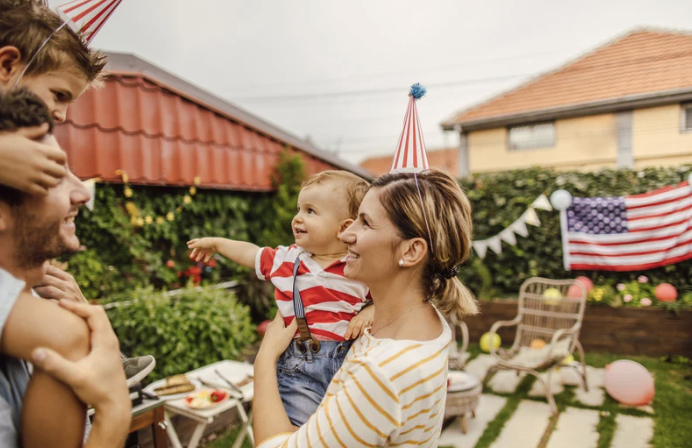Celebrating the Fourth of July with Babies and Toddlers
A Gentle Guide for Every Age
Fourth of July with a Young Baby (0–6 Months)
Keeping baby in arms can be a place of safety for them.
Celebrating Independence Day with a newborn is all about keeping things calm and simple. At this age, babies are still adjusting to the world and are very sensitive to loud noises and bright lights. Consider celebrating from the comfort of your home or a friend’s quiet backyard. If you’re attending a gathering, bring a cozy stroller or baby carrier and stay in shaded, low-stimulation areas. Fireworks are best experienced from indoors or a distance, with white noise or soft lullabies playing to buffer the sound. If your baby does get startled, skin-to-skin contact and soothing voices can help regulate their nervous system quickly.
Fourth of July with an Older Baby (7–12 Months)
Older babies are starting to explore and notice more about their environment, but they can still be easily overstimulated. This is a great time to introduce festive touches like red, white, and blue toys or a patriotic outfit without overwhelming them with crowds. For fireworks, consider watching from a car or far away where sound is dampened. Prepare your baby ahead of time by talking softly about the “big booms” and staying close when they start. Bring along familiar comfort items like a pacifier or blanket, and follow your baby’s cues closely; leaving early is okay. Keep bedtime routines as normal as possible to maintain a sense of safety and predictability. If your baby shows signs of distress, such as crying, arching their back, or turning their head away, take it as a sign they need a break. A quiet walk with a parent or some gentle rocking can help bring them back to calm.
Fourth of July with a Young Toddler (12–18 Months)
Explain to your child what will happen before the festivities begin.
Toddlers at this age are more mobile and curious, but they may also be more sensitive to unexpected or intense stimuli. Help prepare your toddler for the excitement by reading books or showing short, calm videos about fireworks and parades. Use simple language like “Fireworks are loud, but they’re safe and pretty!” Watching from indoors or with noise-canceling headphones can reduce stress. If your toddler becomes overwhelmed, stepping away to a quiet, dim spot can help them recover. Offer choices about how they want to celebrate, whether that’s watching while others hold a sparkler, waving a flag, or just cuddling with you while watching the lights from afar.
Fourth of July with an Older Toddler (19 Months–3 Years)
Remember your child’s behavior is their communication
As toddlers near age three, they may begin to understand the concept of celebration and show more excitement for the festivities. You can talk about Independence Day as a birthday for the country and let them help with simple activities like making red, white, and blue crafts or decorating the backyard. Fireworks are still very loud and potentially overwhelming, so prep them with phrases like, “It might be loud, but we’re safe.” Role-playing or using a “boom” toy (like bubble wrap or drums) earlier in the day can help build familiarity. If they become overstimulated, offer quiet activities like reading or coloring in a cozy space. Naming their feelings, “You’re feeling scared because of the loud sound,” helps them feel seen and safe.
Supporting Emotional Safety During Festivities
Fireworks are a full sensory experience.
No matter your child’s age, the key to a successful Fourth of July is honoring their emotional and sensory needs. Fireworks can be fun for some kids and frightening for others. Normalize all reactions and avoid forcing participation. Create a sensory-safe kit with headphones, snacks, a favorite toy, and water. Stay attuned to your child’s body language and mood, sometimes a quiet evening at home is the most meaningful celebration. Celebrate the holiday in a way that works for your family’s unique stage and temperament. If plans shift because your child becomes overstimulated or tired, that’s okay, flexibility is part of parenting during big events. With your presence and reassurance, your child can feel secure, even in a world full of noise and sparkle. Your calm response helps teach them that their feelings are valid and that home…and you…are their safe place.
The playroom at BabySpace Coachella Valley.
BabySpace Coachella Valley
Becoming a parent is a profound and life-altering experience, but it comes with its fair share of unspoken challenges. Meeting with other parents and exploring together what you are envisioning life could look like with your infant and toddler is an invaluable piece of new parenthood. By sharing experiences with others in a place like a BabySpace Coachella Valley Mommy and Me group, parents can find solace in the shared journey of raising the next generation, embracing both the joys and the trials that come with it.
Serving the Coachella Valley and surrounding areas, including: Palm Springs, Cathedral City, Rancho Mirage, Indian Wells, Thousand Palms, Palm Desert, La Quinta, Indio, Bermuda Dunes, Coachella, Thermal, Mecca, Desert Hot Springs, Yucca Valley, and Joshua Tree.
Therapist Palm Desert, Therapist Palm Springs, Postpartum Therapist Palm Desert, Postpartum Therapist Palm Springs, Postpartum Depression Palm Desert, Postpartum Depression Palm Springs, Pregnancy Therapist, mom support groups near me, mommy and me near me, moms support group near me, new mothers groups
#mommyandme #newmomlife #mommylife #firsttimemom #pregnancy #prenatalyoga #expectingmom #newmom #newmommy #motherhood #parenthood #postpartum #mommyhood #groupsupport #palmdesert #palmsprings #laquinta #coachellavalley #coachellavalleylife #coachellavalleyevents #SAHM #SAHMlife #wfh #wfhlife #wfhmom #wfhmomlife #momlife #mommyanddaughter #mommyandson #girlmom #boymom #pregnant #childbirthclasses





